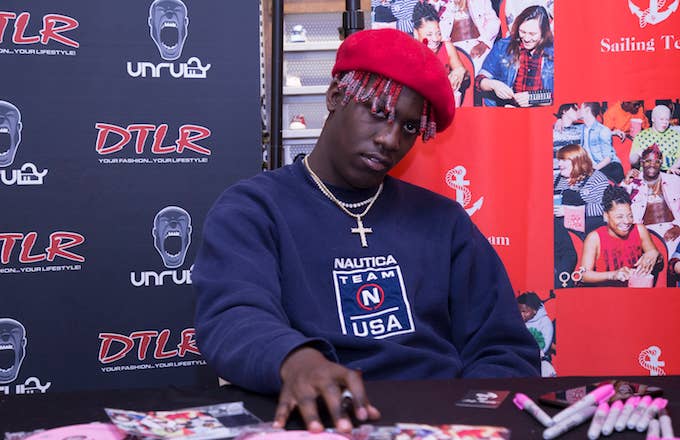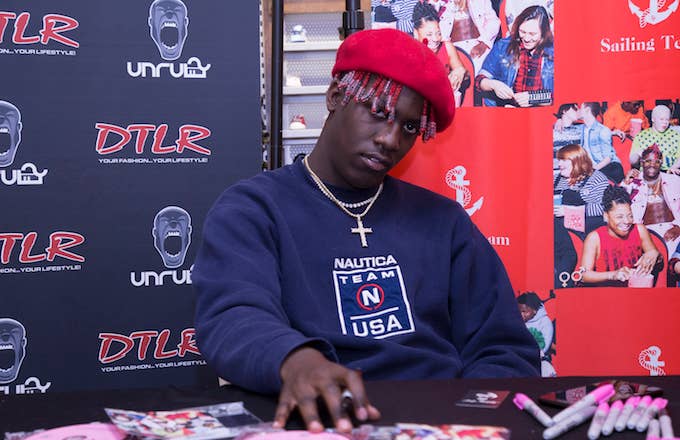
Lil Yachty's debut album Teenage Emotions is the best-marketed rap album in recent memory. That it will sell copies at all is a credit to Yachty and his label QC's shrewd media handling. Your attachment to Yachty was pre-ordained, a rhetorical Chinese finger-trap that either induces surrender to his whimsical charms, or casts listeners as Old Heads and nerds who care about dusty concerns like "real hip-hop," lyrics, or good songs. His real reward for this strategy came before the album was even released, through lucrative marketing deals: Nautica. Target. Sprite. Not since 50 Cent has a rapper's rise been so ascribed with qualities valued by corporate boardrooms; he steamrolled gatekeepers, and anyone holding purse strings let the bag slide open. To watch Yachty's publicity blitz was to see a new star pushed as the spiritual center of a new generation, an avatar for that which adults can't comprehend and teens love, in all its trolling, waggish glory.
Old heads both real and imagined became pawns in a masterful plan to project success before it occurred. Yet the end result is underwhelming. For one thing, contra the legend, Lil Uzi Vert can more rightfully claim a hold on the zeitgeist at the moment—his solo single "XO Tour Llif3" is a streaming monster in Billboard's top 10. Yachty's album, led by non-starting singles like the "Hold On I'm Going Home"-lite "Bring It Back," seems more like a series of statement-pieces than songs, driven by ineffective reaches for the surface texture of rhythmic radio and the pop charts. There's something instantly dated about this approach; Yachty's move away from the genre occurred just as streaming shifted the charts back towards an uncompromised vision of popular hip-hop. If, as Hits Daily Double has reported, songs by Kodak Black and Future now outstream singles by the Chainsmokers, what's the point in competing on foreign ground?
Not that Yachty hasn't staked out creatively worthwhile, high-profile terrain. He co-starred on the oft-streamed Kyle smash "iSpy," matched Detroit newcomer Tee Grizzley bar-for-bar on street anthem "From the D to the A," and earned spins off last summer's "Broccoli" with D.R.A.M. But Yachty is always the guest—intrinsic to each song's success as (ironically enough) a lyricist. It might be D.R.A.M's hook that made it a hit, but it's Yachty's star turn, with edgier lines about Columbine, that gave it real pop culture presence. His vocal style is immediately recognizable, distinct. Despite his reputation for being a poor rapper, he has surprising facility with rapping as a technical sport, though part of its appeal is that it's undersold. For all the faults of his debut, his status as a star is undeniable, even as it relies on the smoke-and-mirrors tactics that led to his premature coronation as "King of Teens."
Why doesn’t Teenage Emotions work? Why doesn’t anything work? Who cares what critics think? I'm not here to defend the existence of paid thinking jobs, because anyone in a creative field is, in the eyes of our economy, doing the same thing. (If you're not getting paid for criticizing music, you're doing it for free.) For similar reasons, I take no joy in saying that Lil Yachty's art is wanting. Musicians, critics, fans posting YouTube links—we all create content that’s gobbled up by companies and platforms, who gain obscene amounts of free data from our labor in an effort to better sell us products. In a book called Who Owns the Future?, philosopher Jaron Lenier called those platforms siren servers, named for the mythic predators who seduced sailors with beautiful songs only to kill them.
In real terms, siren servers offer us free services in an effort to vacuum up most of the wealth from our unpaid creative efforts. Anyone getting paid to do work—writing criticism, taking pictures, making music—is in a perpetual battle to garner the attention and investment of a decreasing number of increasingly wealthy gatekeepers, who also have a massive amount of free rival content to choose from. This means market saturation, and a focus on traffic, numbers, data, algorithms—an abstracted, seemingly objective measure of success to separate the wheat from the chaff. (From the economy's POV, most of us not generating large amounts of revenue are chaff.) SoundCloud—the realm from which
The real hip-hop heads vs. teens divide pre-dates Yachty, hearkening back to the late 1990s, when Puff Daddy took hip-hop by storm.
Yachty sprung—is one such siren server.
In some ways, SoundCloud's social aspects make it an exciting ecosystem because it allows oddball shit to flourish; its relatively small, young, disproportionately influential user base has helped propel artists whose aesthetic choices might sit outside traditional channels, and its reblogging feature gives songs quick momentum through the music industry's primary new metric: streams. To outsiders, its algorithmic and socially-driven aspects give it a patina of the democratic, a welcome reaction to the industry-, blog- and publication-driven dictates that preceded it.
It's also somewhat easy to game, if you know what you're messing with. The closer you are to the aesthetic of, say, the Suicide Boys—a duo whose styles reflect an almost note-for-note recreation of 1990s Memphis, and finds their songs exceedingly popular with the site's hardcore users—the more apt you are to find success. Likewise, an artist able to earn the loyalties of the community's more influential members—as Yachty implied he'd done in a 2016 interview with the Fader—is able to quickly build support for their work.
I don't mean to suggest there was something inauthentic or conspiratorial about his success, any more than there is for any artist. Most fans don't care how a song reaches them, as long as enough of them like it when it does. And so Lil Yachty's arrival with his most complete solo hit, 2015's "1 Night," sold his sound and style completely: a novel surface aesthetic, his winking, naif persona an ironic cover for his professed detachment from his sexual partners. The loopy, half-irritating, half-catchy "Minnesota" was not quite a hit, but it further illuminated this new artistic terrain, a negotiation between trolling the self-serious and writing original songs built around unexpected, memorable concepts and a particular melodic sensibility.
Plus, Yachty just seems likeable. One progenitor of this style—as well as the godfather of SoundCloud rap today (though he built his career on YouTube)—was teen sensation Chief Keef. Keef’s sound and style was massively popular and influential but his temperament (some might say a product of his traumatic origins; possibly just his own personality) only occasionally meshed with the requirements of capitalism. ("Still can't make those meetings on time," he intones on his underrated recent mixtape, Two Zero One Seven.) In inverting Keef's demonic on-record persona to a cheery, enthusiastic one—"positive," some would argue, oblivious to the pro forma misogyny woven throughout his verses—and by showing up on time for carbonated sugar water commercials, Yachty was set to prove he was the market-friendly rap star the industry needed.
His all-shortcuts approach to success is, of course, something his fans are already aware of, and embrace. It's something they appreciate in his music; it's a part of his personality, inextricable from it, much in the way Jay Z's bulletproof demeanor and business savvy were intertwined with his own. It's this personality fans are drawn to—a cult of personality, of democratized, algorithmic A&Rs eager to crown a new king. Root for him: he's putting one over on the ruling class. If I were a brand critic, perhaps this would be worthy of celebration; as a music critic, it's rough going. Teenage Emotions itself feels like a shortcut, a carefully positioned exercise in branding so blankly executed, it makes one question Yachty's interest in the craft of music.
It's not that melodic pop records are antithetical to Yachty's style; "Out Late," from his Lil Boat mixtape, struck a chord of sincere affection without undermining the irreverent bad boy underneath. Yet there's a sterility to this project as it alternates from under-delivering in the songwriting department—as on the meandering "Moments in Time"—to performing a clever trace of a studio-rendered song product that doesn't really jibe with his usual melodic sensibilities—as on sentimental sing-song "Forever Young."
Even records that don't bank on melodic pop can rely too heavily on artistic crutches, like “Peek-A-Boo,” featuring Migos. Lyrically, the picture Teenage Emotions draws of Yachty does not extend far past tell-don't-show, hitting on the album's major themes without pulling us into his world. Still, "Say My Name" has a low-key vulnerability underlying its gleeful confidence that is affectingly teenage. And "Priorities” is a coherent conceptual record which suggests honed, self-aware writing, a song of controlled recklessness that amusingly communicates his generational divide bona fides.
There is a very real generation gap in appreciating Yachty's work, but it doesn't determine if one is more or less apt to like it, as much as how we engage with it. The real hip-hop heads vs. teens divide pre-dates Yachty and Keef both, hearkening back to the late 1990s, when Puff Daddy took hip-hop by storm, creating a rift that would last a generation. Puffy couldn't rap according to the expectations of style and flow that established the greatness of his era, and he remade other people's hits as his own. For a long time, he was derided not just by serious cultural guardians, but by a mass-intellectual consensus, for dumbing down an art form. If Pete Rock and J Dilla dug for samples and obscured their origins, Puff took hits from the '80s and made 'em sound so crazy.
Ultimately fans who stuck to subterranean Tims-and-hoodies boom-bap seemed dogmatic in comparison. Songs that were derided then are now cornerstones of the late '90s canon; few would admit these days to having sided against Bad Boy, to having resisted the urgent, celebratory joy of "Can't Nobody Hold Me Down," to have not appreciated the effervescent panache of Mase in '97.
I'd argue it's this history—a fear of being left behind as the culture moves on, of seeming out of touch with Yachty's brand-centric prosperity gospel—which has defined his arrival, rather than the high-profile media battles with ostensible cultural guardians like Ebro or Joe Budden. These media figures play the heel, provide spectacle, to ensure fans know where to stand. But Teenage Emotions will not reward them.
This is not a dismissal of Yachty's career in total; he has a talent for marketing and an underrated gift for rapping. But it is an argument that Yachty, unlike Puffy, may have underestimated his own abilities. Puffy's use of other people's hits was audacious, and it worked because he understood that music's history was hip-hop's canvas, and that success in music was built upon great songs—the brand would follow. Everything about popular music is marketing, including the songs themselves: they sell the artist as much as the artist sells them. Lil Yachty is very good at selling his songs, but his songs do a bad job selling us on him.


